Challenging future teachers to think critically

“I try to create a space where we can talk with each other,” says Rico Gutstein, professor of curriculum and instruction. Photo: Joshua Clark/UIC Photo Services
Each year, UIC honors some of its most dedicated and outstanding teachers with the Award for Excellence in Teaching. The winners, who receive a $5,000 salary increase, are selected by past recipients of the award from nominations made by departments and colleges.
Rico Gutstein doesn’t want his students to take his word for anything.
“I don’t want them to believe me, I don’t want them to believe what they read, without independently critiquing and making up their own minds,” says Gutstein, professor of curriculum and instruction in the College of Education. “I try to create a space where we talk with each other and people respect multiple views. I will invite people repeatedly to speak because they have that knowledge and what they have to say contributes.”
Gutstein, co-founder of the activist group Teachers for Social Justice, urges students to “understand the power relationships behind what we see: who benefits, who does not.” He teaches mathematics for social justice, guiding students to analyze the numbers that illuminate issues like racial profiling, the subprime mortgage market, and displacement due to gentrification.
While teaching future teachers at UIC and DePaul University, Gutstein was also a classroom teacher in the Chicago Public Schools in Pilsen and Lawndale for many years. During the late 1990s, he adopted the principles of Brazilian educator and theorist Paolo Freire, author of the 1968 The Pedagogy of the Oppressed who later combined mathematics curriculum with social justice issues.
“I was trying to understand my job teaching math in a Pilsen middle school, so I turned to theory to understand my practice,” Gutstein says. “Mathematics becomes a way to begin to ask real questions about what’s happening in the students’ worlds. In the process, they learn mathematics and they learn about the world, and they learn about these two things in relation to one another.”
Gutstein teaches a popular class every spring on Freire’s principles called “Critical Pedagogy.” It attracts not only education students, but those in urban planning, nursing, public health and sociology.
For education undergraduates, he teaches math for elementary education. On the doctoral level, he teaches mathematics and science education.
In a letter of recommendation for the Excellence in Teaching award, visiting clinical lecturer Daniel Morales-Doyle wrote that he experienced the “profound impact” of Gutstein’s teaching three times: first as a member of Teachers for Social Justice, then as a teacher at a Lawndale school, and now as a doctoral student at UIC.
“People said peers were supposed to write the letters,” Gutstein says, “but I thought: I’m just going to go with the people who I think know me.”
